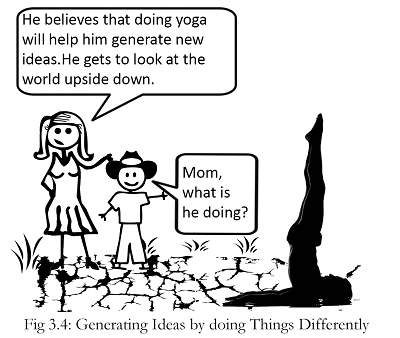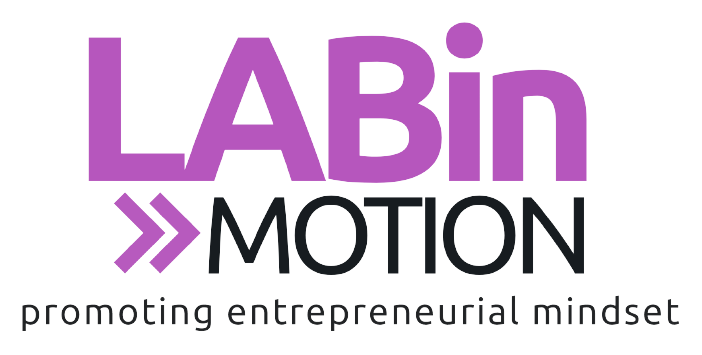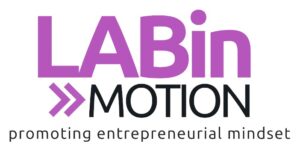After identifying customer needs by using the Customer-Action-Cycle framework, the entrepreneur or marketer is likely to sit down with the team to explore ideas for meeting these needs. Generating new ideas requires us to become aware of the world around us, question that world and generate alternatives. However, in order to implement those ideas you have to experiment and test the alternatives with a large population of people. In a world where we have developed fixed mindsets about so many things around us, is there a way we can generate new ideas by looking at things differently?
Thankfully, developing the skills below can help us in the process of generating new ideas –
- Develop Keen Awareness
using the five senses – seeing, hearing, touching, smelling and tasting - Look for Possibilities
questioning the status quo – how else? what else? what if? - Explore Relatedness
looking for patterns of relatedness using knowledge, analysis, comparisons and imagination
Developing Awareness
One can consciously develop a discerning sense of the world by sharpening observation skills using one’s five senses. This can help us see what others are not seeing, hear what others are not hearing and feel what others are not feeling. Observation requires noticing things the way they are, without passing judgement. Below are a set of observations that you are likely to experience every day –

- Children wear student ID cards around their neck. Some of them tend to misplace the card.
- My home help wants to learn English. She is not in a position to afford the cost of these courses.
- Parents put their children into various activities classes after school hours.
- In the last two days, I have seen more than 20 senior citizens sitting and chatting for more than two hours in the park.
- I see more than five cars in the parking lot that have a layer of dust.
- There is a box of unused tablets of medicine in my house.
When you remove the judgement part out of your observations, it enables you to approach a subject without any preconceived prejudices about how it needs to be done. This opens more choices for action. Some of the above observations may not be very specific. You just need to be aware of the vagueness in some of your observations. You can make observations based on your own experiences or based on what others share (vicarious experiences). Indirect experiences could be through sources such as the TV, newspapers, things shared by friends, social media or listening to audio recordings. Many businesses spawned because the founders faced a problem that did not appear to have a solution in the market, e.g., Redbus, Johnson & Johnson (Band Aid), Housing.com, Onesolution.in, 3M – Masking tape,etc.
Looking for Possibilities
This requires questioning the status quo. It requires asking the right questions. There are two categories of questions that can help – questions that help us understand “What is?” and questions that help us understand “What can be?”
Asking “Why?” can be helpful in understanding observed phenomena. It helps you analyse the causes of certain behaviour, gain better understanding of a phenomena and adds to your knowledge base. The knowledge acquired by asking questions like “Why?” and “Why not” helps you understand the feasibility of solutions to the question “What can be?”
However, “Why?” is not very useful in generating new ideas. “What else?”, “How else?” and “What if?” are questions that can help generating new ideas. Let us take a couple of our observations and look for possibilities –
Observation: Children wear student ID cards around their neck. They tend to misplace the cards.
Questions: How else can they be identified? What else can be used instead of strings around the neck? What if the card is lost – how will I identify the child?
Exploring Relatedness
Do you see patterns of relatedness between various observed phenomena? Pattern recognition is a cognitive exercise and a thinking skill that can be developed. This requires developing divergent thinking skills that can be useful in discovering diverse choices (or possibilities). Discerning this relatedness requires acquired knowledge, imagination, and the power to analyse, judge and compare.
Here are 20 fun activities you can use whenever you have a few minutes. These would make terrific writing prompts.
Fun activities to explore relatedness and associations
They could also spark some interesting discussions.
- How would life be different if there were no electricity? List three different ways.
- Explain a flower to someone who has never seen or heard of one before.
- Write a story about the zoo without using the names of any animals.
- Pretend that you get to make one rule that everyone in the world must follow. What rule do you make? Why?
- What kind of soup would you eat for dessert? Write a recipe for dessert soup.
- You can have any three things that you want. In return, you must give away three things that are about the same size as the things you get. What do you get and what do you give away?
- What are some ways you could celebrate “Backwards Day?”
- Are you more like a square or a circle? Why?
- How would the game of soccer be different if the ball was shaped like a cube?
- What are the three ways the world would be different if people did not need to sleep? What would you do with the extra time?
- What would happen if all the bowling balls and bowling pins in the world suddenly became alive?
- Which do you think is more important: motorized vehicles like cars and aeroplanes or computers? Why?
- If you could choose one thing that costs money and make it free for everyone forever, what thing would you choose? Why?
- If you could live in a treehouse, would you? What are three advantages and three disadvantages to living in a treehouse?
- If people could not see colors, how would traffic lights work? Design a traffic system that does not rely on colors.
While you may be engrossed in generating new ideas, do not forget that the ideas generated are required to meet the goals of your customers and the entrepreneur. Visit this article on how to set your goals.





